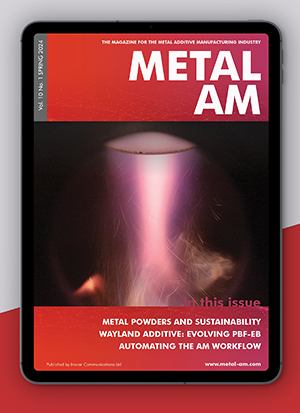German-Chinese consortium develops secure cloud platform for Additive Manufacturing in ProCloud3D project
April 2, 2024

In a German-Chinese project consortium, the Chair Digital Additive Production DAP at RWTH Aachen University has developed the architecture for a secure cloud-based platform that enables the encrypted and real-time transmission of production data for Laser Beam Powder Bed Fusion (PBF-LB) Additive Manufacturing. The results from the ProCloud3D project, funded by the Federal Ministry of Education and Research (BMBF), are intended to lay a foundation for secure decentralised Additive Manufacturing.
The industrial metaverse, smart services and digitalisation are mega trends in the manufacturing industry into which Additive Manufacturing is able to integrate, transforming digital models into physical components. A key function in efficiently implementing these concepts is the cloud. It offers the essential infrastructure needed for processing, storing, and securely sharing data in real-time, irrespective of location. The consortium behind the ProCloud3D project has made this infrastructure securely accessible for Additive Manufacturing.
From the end user’s perspective, the Additive Manufacturing of components is increasingly being outsourced. To manufacture these components, the end user must share their design data with a service provider. Given that a digital design model is all that is needed to produce a physical copy, securing this process is crucial. The solution involves transferring production data layer by layer directly to the service provider’s PBF machine during the manufacturing process, a method also known as streaming. However, it is crucial to ensure that this data cannot be intercepted, compromised, or manipulated and that only the requested number of components is produced. Furthermore, the data for a manufacturing order must be meticulously compiled and prepared for the production process.

Against this backdrop, the researchers initially developed a slicer for the real-time generation of machine control code from the construction job information. The architecture of the ProCloud3D platform, for this purpose, is fundamentally based on the Open Vector Format, developed by researchers from the DAP Chair and the Fraunhofer Institute for Laser Technology ILT. The format supports, among other things, the flexible control of lasers with galvanometer scanners, the management of multiple scan field arrays, and the expansion of additional machine axis controls.
Building on the OVF, a streaming protocol was developed that ensures efficient real-time transport of PBF-LB production data encryption. With a high-performance nester developed by DAP, manufacturing jobs consisting of multiple components can be automatically generated. In a cloud-based user interface, the functionalities are fully integrated and visualised. Part of this solution is digital rights management along the depicted supply and process chain. The data streams are end-to-end encrypted. Hardware-wise, a project-developed machine interface processes the layer-wise control commands from the cloud. The streaming protocol defines who gets access to the data and in what quantity the ordered components are allowed to be manufactured.
Utilising this developed cloud solution, the consortium successfully manufactured a demonstrator via the secure stream. The next step involves preparing the cloud-based platform for mass-market adoption in decentralised Additive Manufacturing. The developed hardware interface will be made compatible with various equipment manufacturers. Access to a universally applicable cloud-based software service tailored for manufacture-specific PBF-LB will also be provided.
The developed cloud solution is designed to outsource companies’ manufacturing processes to a specially designed secure cloud-based platform, these companies can directly tap into the potential of Additive Manufacturing. This approach is expected to eliminate the need for high investments in PBF machines and the extensive development of specialised process know-how previously necessary. This solution acts as a catalyst for the adoption of Additive Manufacturing, enabling companies to digitalise and outsource their production in an efficient and secure manner.
The Project Consortium consists of:
- WIBU-Systems AG
- LMI – Laser Melting Innovations GmbH & Co. KG
- RWTH Aachen Lehrstuhl Digital Additive Production DAP
- Beijing University of Technology
- BLT: Xi’an Bright Laser Technologies Co., Ltd.
- Nanjing 1001 automation technology co. LTD.
- Beijing aerospace smart manufacturing technology development Co., Ltd.
This research and development project is funded by the Federal Ministry of Education and Research (BMBF) under the programme Innovationen für die Produktion, Dienstleistung und Arbeit von morgen and is managed by the Project Management Agency Karlsruhe (PTKA).
Download Metal AM magazine

















